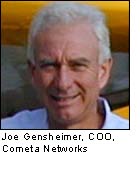
|
|
|
 |
|
 |
Mobile Interactivity: Why Should Business Managers and Consumers Care?
Tech@Tuck April 24, 2003 The Center for Digital Strategies hosted its third event in its Tech@Tuck series for the Tuck, Thayer and Dartmouth communities. This day focused on the impact mobile services and devices have on our lives as consumers and business leaders. |
||
|
Panel/Panelists photos
Panel Overview
Wi-Fi Hot-Spots:
Panelist Bios
Event Schedule
Press Release
|
|||||
This event explored the relevance of developing technologies to our lives as business executives and as consumers. We explored the relevance of computing and communications mobility, what it enables and what it costs. How will it affect the life of the average consumer? What will it enable that they can't do now? Why should they care? In a company, how will it affect how a business operates? Will it change their supply chains? Their sales forces? Will mobile devices and applications offer the next significant productivity change? Is this a truly transformational capability coming down the pike? We looked at these questions from the perspectives of various players in the unfolding drama, from service and applications providers to industry analysts to corporate execs who will determine what to make available to the employees in their companies.
The key parts of the day were: (i) a display and demonstration of mobile devices; (ii) a small group career discussion for MBAs interested in going into this arena, and (iii) the highlight of the day, a dynamic panel of senior business executives debating the future and relevance of mobile.
Panel - "Mobile Services: Why Should Businesses and Consumers Care?"
The panel consisted of a dynamic group of business executives and observers of the various aspects of the emerging mobile arena. Students, faculty and staff from Tuck, Thayer and Dartmouth as well as some of the demonstrators from earlier in the day made up the greater than 80 people in attendance. The goal of the panel was to have a robust discussion answering the following on mobile services for businesses and consumers:
- What's the realm of the possible and where are we headed?
- How to think about mobility and mobile services?
- How will mobile change how companies work and interact?
- Why should we as consumers and business executives care?
Our panelists were:
- Jim DeBelina, Director, Enterprise Solutions, Motorola
- Joe Gensheimer, COO, Cometa Networks
- Bob Maher, Director of Strategic Planning, Mobile Device Marketing Group, Microsoft
- Jim Slaby D'83, Senior Industry Analyst, Forrester Research
Discussion - "Start-up vs. Large Tech- Career Hot Spots for MBAs"
A small group discussion with Joe Gensheimer of Cometa Networks and Jim DeBelina of Motorola. They discussed questions like: How did they get their careers started?; How to 'break into' the tech industry; What it's like to move between startups and corporations; What the latest industry trends and most important players are; and what does it take to land a job as a product manager, project manager, or product marketing engineer?
Demo/Display of Devices
Apple Computer Inc., Dartmouth Student Assembly Web Team, Dell Computer Corporation, Microsoft Corporation, Motorola, Newbury Networks, Nokia, Numbers Only Inc., Palm Inc., and the Thayer School had devices on display. The devices were active so that people could interact with and utilize an application on them within the limitations of network coverage in this area. We were pleased to be the first to demonstrate the newly released Palm Tungsten C with 802.11b wireless as well as to share what technology is doing for our armed forces in the Thayer School display which demonstrated a portable, wireless physiological monitoring system for soldiers in the battlefield.